Presented by BetterHelp.
A typical fear response differs from a panic attack in that there is no real danger involved.
People who have had a panic attack worry about having more, especially in public, because panic attack causes aren’t usually obvious. Having a panic attack can be extremely upsetting and distressing for the sufferer. Many people believe they are having a heart attack or another life-threatening condition.
Having a heart attack or other life-threatening problem is a common fear among the general populace, and many people may misconstrue a panic attack for these life threatening conditions. People who suffer from panic attacks can benefit from a few things you can do during or in the immediate aftermath of an episode.
Why Do Panic Attacks Happen?
Why some people suffer panic attacks or develop a panic disorder remains a mystery to doctors and psychologists. There are several factors that contribute to how you experience fear and anxiety. Panic attacks are more likely if you have any of the following:
From our partners:
- Anxiety disorders, such as panic disorders that commonly run in families, although there’s no clear answer as to why
- Anxiety, sadness, and other mental illnesses might increase the risk of having a panic attack.
- Panic attacks might be exacerbated by a history of alcoholism or drug addiction

Signs To Look Out For
Consider familiarizing yourself with the early warning symptoms of a panic attack if you haven’t already.
Most panic episodes begin with one of these:
- fear or anxiety
- hyperventilation or shortness of breath
- feeling like they’re choking
- Heart palpitations
- vertigo and tremors
It’s vital to find out what symptoms the person you’re concerned about has, as not everyone suffers panic attacks in the same way. Help them to a more secluded location or where they may feel more at ease as quickly as possible if they’re in distress.
How To Help
Stay Calm
One of the best things you can do to help is to keep your cool. When you’re having a panic attack, it doesn’t last long. The most severe feelings usually last between five and ten minutes.
However, a person who is experiencing an attack may not have much of a sense of time passing. They may be afraid or believe they will die.
No matter how nervous you are, remain composed. Talk to them in a calm voice if it seems to help and they haven’t instructed you to keep silent.
Ask Them What You Can Do
Panic attacks and other forms of anxiety are common, and most people who suffer from them have their own personal coping mechanisms. Keep in mind that your loved one is the best judge of what will help the most when you offer support.
During an attack, it may be more difficult for them to express this. Prior to the event, inquire as to what your role will be should an attack occur. It’s quite acceptable to inquire how you can help during an attack. Prepare yourself for a brief or terse response.
A person’s ability to reason and act rationally might be harmed by the stress response known as the fight-or-flight response. Keep a cool head and don’t take anything personally they say.
Walk Don’t Talk
Try to avoid saying phrases like “don’t worry” or “are you alright?” over and over again to folks who are having a difficult time.
Obviously, you’re trying to be helpful, but your words may not be of much use right now. If your loved one thinks they are doing something wrong by not being okay, they may become even more anxious. Visit this page to learn more about the science behind panic attacks.
Accept That It May Not Make Sense
As well as frightening, panic episodes can be difficult to understand. People are usually unable to predict them, and there is typically no apparent explanation for their occurrence or origin. Even in the midst of a peaceful moment or a deep sleep, they can occur unexpectedly.
Your friend might benefit from hearing that there is nothing to worry about. However, it’s likely they’re fully aware there isn’t any real danger.
As a result, panic episodes might be difficult to understand. But there’s nothing to worry about because there’s nothing to dread. As a result, someone who suffers from panic attacks may begin to fear the symptoms or associate them to a more serious health issue.
It’s normal to be embarrassed or ashamed at such a strong response. However, if a trusted companion offers support, the person can return to their normal state. Your ability to show empathy and acknowledge their pain is the most important thing.
Validate Their Experience
People with mental health difficulties, such as panic attacks, frequently find it difficult to openly discuss their experiences.
Some people avoid discussing mental health difficulties out of fear that others won’t be able to empathize with them. It’s not uncommon for people to be concerned about being judged or being told that what they go through isn’t important. Panic attacks are commonly misunderstood and even seen as irrational by those who have never experienced them.













